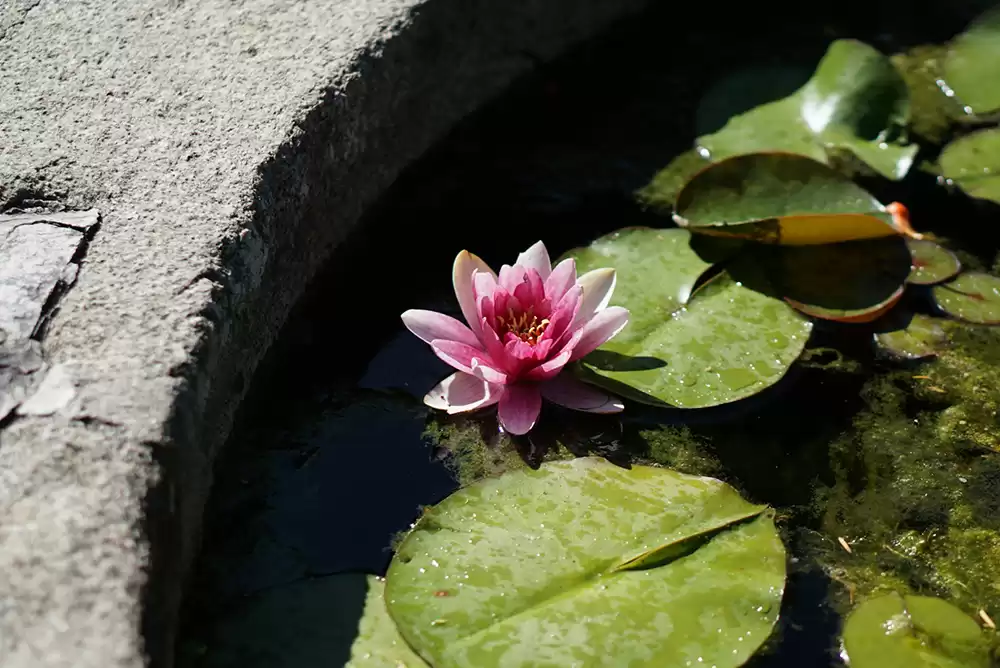
01 Jul How Pesticides Affect Aquatic Pond Plants
Koi pond owners need to know how pesticides can affect their aquatic plants and the overall pond ecosystem. Continue reading to learn how pesticides affect water plants, the symptoms of exposure, and safe pest control alternatives to help protect your koi pond.
Introduction to Pesticides and Aquatic Pond Plants
While pesticides are beneficial in managing unwanted insects and weeds, they can pose significant risks to aquatic environments. Pesticides can easily enter ponds through runoff, drift, or direct application, adversely affecting your koi pond’s ecosystem over time.
Common Types of Pesticides and Their Uses
Potential sources of contamination may include insecticides, herbicides, and fungicides. Insecticides kill insects, herbicides control unwanted plants, and fungicides prevent fungal diseases.
Direct Effects of Pesticides on Aquatic Plants
Pesticides can directly affect aquatic plants by causing cellular damage, disrupting photosynthesis, and inhibiting growth. Common symptoms of pesticide exposure are yellowing leaves, stunted growth, and necrosis. These effects can compromise the health of your aquatic plants, reducing their ability to oxygenate the pond water for your fish.
Indirect Effects on the Pond Ecosystem
Beyond direct plant damage, pesticides can disrupt the pond’s ecosystem by harming beneficial microorganisms, reducing water quality, and affecting the health of koi and other pond inhabitants. This disruption can lead to algae blooms, decreased oxygen levels, and adversely impact the health of your koi pond.
Symptoms of Pesticide Exposure in Pond Plants
Symptoms of pesticide exposure in aquatic plants include:
- Yellowing or browning of leaves
- Stunted or distorted growth
- Leaf drop or dieback
- Reduced flowering or seed production
- Visible chemical residues on plant surfaces
Prolonged exposure to pesticides can lead to chronic health issues in aquatic plants. Persistent chemicals can accumulate in plant tissues, leading to long-term growth inhibition and increasing their susceptibility to diseases and pests. This accumulation can also affect the entire food chain within your koi pond ecosystem.
Safe Pest Control Alternatives for Koi Ponds
To protect your pond plants and koi, consider these safe pest control alternatives:
Biological Controls: Use beneficial insects such as ladybugs to manage nearby pest populations naturally.
Mechanical Controls: Add physical barriers or traps to reduce pest access to the pond.
Organic Pesticides: Opt for natural pesticides that break down quickly and have minimal impact on aquatic life.
Preventative Measures for Minimizing Pesticide Contamination
These prevention tactics will further minimize pesticide contamination in your pond:
Buffer Zones: Establish vegetation buffers around the pond to absorb runoff.
Proper Application: Follow label instructions carefully and avoid spraying pesticides on windy days.
Integrated Pest Management (IPM): Implement IPM practices to reduce your reliance on chemical pesticides.
Monitoring and Testing for Pesticides in Pond Water
Regular monitoring and testing of pond water can help detect pesticide contamination early. Consider using water testing kits or professional services to check for common pesticides and other pollutants.
Regulatory Guidelines and Best Practices for Pond Maintenance
Adhering to regulatory guidelines and these best practices is essential for maintaining a healthy pond:
Follow Local Regulations: Ensure compliance with any local pesticide use regulations.
Educate Yourself: Stay informed about the latest best practices in pond maintenance and pesticide management.
Seek Professional Help: Consult with koi pond maintenance professionals to develop a safe and effective pest control plan.
Protecting your aquatic pond plants from pesticide damage requires a comprehensive approach that combines prevention tactics, safe pesticide alternatives, and regular monitoring.
Aquatic Gardens is here to help you create and maintain a thriving koi pond. Contact us anytime and ask about our aquatic plants and koi ponds for sale.



